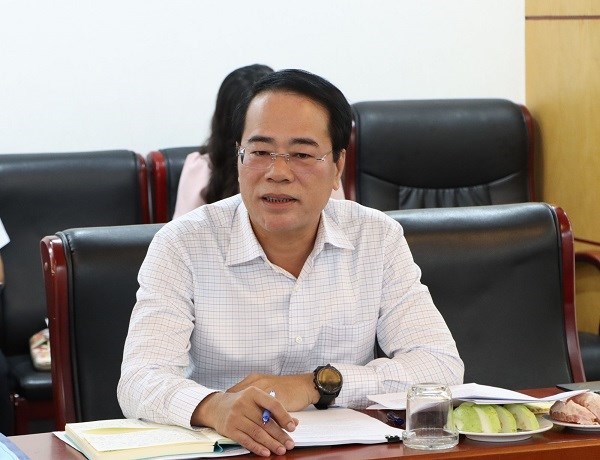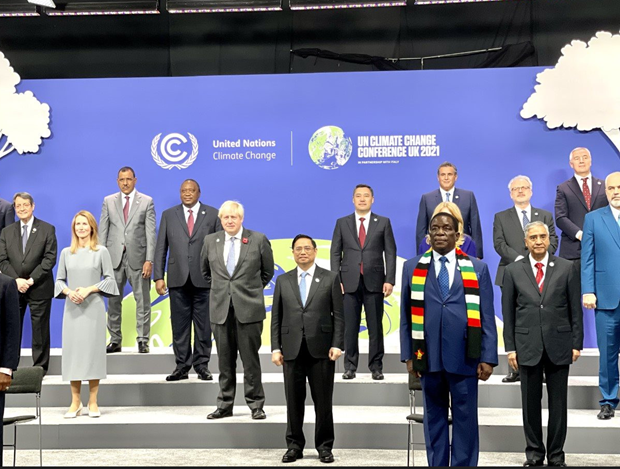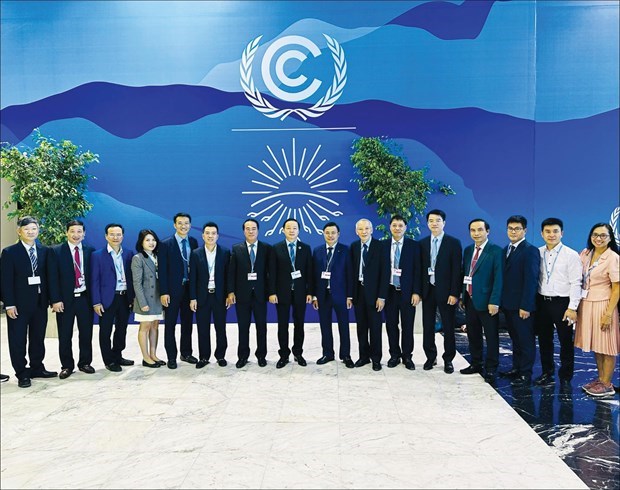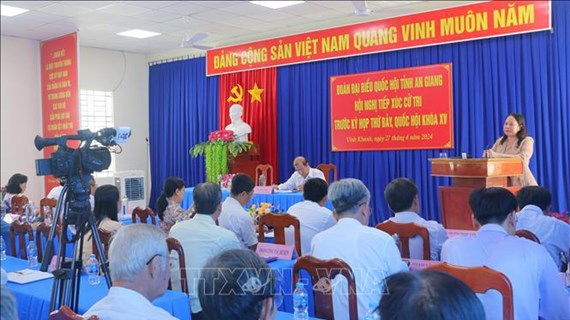Vietnam makes substantive contributions to fight against climate change: official
Over the past 15 years since the Kyoto Protocol became effective, Vietnam has actively joined and made substantive contributions to the fight against climate change, and affirmed the efficiency of its management over climate change response and ozone layer protection, Director of the Department of Climate Change Tang The Cuong told VietnamPlus e-newspaper of the Vietnam News Agency.
 Director of the Department of Climate Change Tang The Cuong. (Photo: VietnamPlus)
Director of the Department of Climate Change Tang The Cuong. (Photo: VietnamPlus)Reporter: Firstly, could you tell us about the highlights in the journey to respond to climate change in Vietnam?
Tang The Cuong: Vietnam is one of the countries most affected by climate change. In that context, in 2008, the Ministry of Natural Resources and Environment established the Department of Meteorology, Hydrology and Climate Change (now Department of Climate Change) to strengthen the state management of hydro-meteorology and climate change.
In the 2008-2013 period, hydro-meteorological management was established uniformly from the central to local levels, creating a foundation for the nation’s response to climate change. The department built a project to modernise forecasting technology and hydro-meteorological monitoring network for the 2010-2012 period; together with regulations on warning and forecasting of natural disasters at sea, and those on warning of tropical low pressures, storms and flood..
In addition, the department has implemented dissemination activities on climate change response to help state management agencies, socio-political organisations and the community to understand more about the causes and effects of climate change on the environment and social security, and solutions to minimise the impacts and strengthen adaptation capacity.
From 2013-2017, Vietnam continued with its strong integration into global efforts to tackle serious challenges posed by climate change. Along with the adoption of the Paris Agreement at the 21st United Nations Climate Change Conference (COP21), Vietnam was one of the early countries to build a nationally determined contribution (NDC) plan, which demonstrates its great efforts and responsibility in global climate change response.
The department made recommendations to the Prime Minister for the approval of the National System for the Greenhouse Gas Inventory and to the Government for the ratification of the Paris Agreement and issuance of a plan for the implementation of the agreement. The department also advised the 11th Party Central Committee in the issuance of Resolution No. 24-NQ/TW on proactively responding to climate change, and strengthening natural resource management and environmental protection.
 Prime Minister Pham Minh Chinh and foreign leaders attend COP26. (Photo: VietnamPlus)
Prime Minister Pham Minh Chinh and foreign leaders attend COP26. (Photo: VietnamPlus)Through the efforts of state management agencies, the awareness of the urgency and vital importance of responding to climate change at all levels, sectors and the whole society has been raised markedly. Responding to climate change has become the responsibility of every citizen, and attracted the engagement of the entire political system from the central to local levels.
Since 2017, the department has created important milestones in the state management over climate change, contributing to the making of strategic decisions of Party and State leaders, thereby enabling Vietnam to make substantive contributions to global efforts.
State management was more comprehensively institutionalised in the 2020 Law on Environmental Protection, with additional regulations on climate change adaptation, greenhouse gas emissions mitigation, protection of the ozone layer; the organisation and development of the carbon market; greenhouse gas inventory; national database on climate change; and the implementation of international commitments. Detailed regulations guiding the implementation of the law have been issued as well.
At COP26, Vietnam and 147 countries accounting for nearly 90% of greenhouse gas emissions and over 90% of global GDP committed to bringing net emissions to zero by the middle of the century. Right after that, the Prime Minister established a steering committee for the implementation of commitments at COP26, and promulgated important strategies and decisions which are being implemented.
Those are important highlights in the picture of the country's integration with the world on climate change, thereby affirming Vietnam’s position, and at the same time bringing it "dual" benefits from the opportunity to access knowledge, technology and green finance, restructure the economy as well as proactively responding to climate change.
Reporter: At present, climate change is still developing complicatedly. So in order to minimise the risks and damage that can be caused by natural disasters and extreme climate, how has the Department of Climate Change participated in this "big fight" against climate change?
Tang The Cuong: Climate change response over the globe and in our country has entered a new phase, with opportunities arising from the fact that Vietnam has been deeply and substantively participating in the global joint efforts.
The department has advised the ministry (Ministry of Natural Resources and Environment) in making recommendations to the Government and the Prime Minister on many important contents, keeping updated on new international trends and clearly defining urgent and priority issues associated with the implementation of the Paris Agreement and Vietnam's commitments at COP26, such as: a national strategy on climate change for the period to 2050, an action plan to reduce methane emissions until 2030, and an updated NDC in 2022.
 Minister of Natural Resources and Environment Tran Hong Ha (now Deputy Prime Minister) leads a Vietnamese delegation to COP27. (Photo: VietnamPlus)
Minister of Natural Resources and Environment Tran Hong Ha (now Deputy Prime Minister) leads a Vietnamese delegation to COP27. (Photo: VietnamPlus)Reporter: In fact, in Vietnam, how has the awareness of the community, businesses, and people changed as a result of these important policies?
Tang The Cuong: To date, almost all localities have issued action plans for climate change response, as well as plans to implement the Paris Agreement, and at the same time organised the implementation of Vietnam’s commitments at COP26.
Localities also proactively urge and guide local establishments that are subject to greenhouse gas inventory in accordance with law.
The business sector has also really paid attention to climate change, and greenhouse gas inventory towards achieving the net zero emissions target.
Especially, over the past time, the community and people have become deeply aware of climate change, so many climate change adaptation models have been carried out, including community-based, ecosystem-based and smart ones.
It can be seen that climate change has become one of the focus and important contents in the agendas of Party and State leaders, in the national development guidelines and decisions.
Reporter: As the head of the Department of Climate Change, can you share about the roadmap as well as its key tasks in the coming time?
Tang The Cuong: In the long term, the response to climate change is showing positive changes, giving rise to new expectations.
However, in the short term, when climate change is still complicated and global response efforts have only brought about expectations, it is still necessary to continue to actively respond to negative impacts of climate change.
Therefore, the department is facing opportunities as well as many challenges. It is necessary to actively engage in the improvement of legal regulations to respond to climate change; participate in and contribute to global and regional initiatives on climate change to serve socio-economic development, promote the transformation of development models towards sustainability, green economy, circular economy and less emissions.
Reporter: Thank you very much!/.












